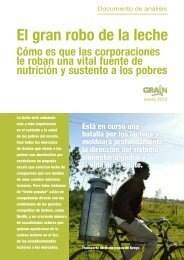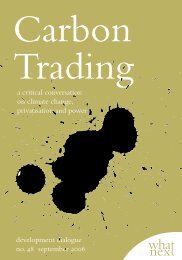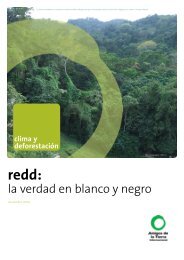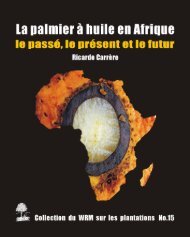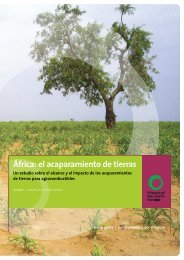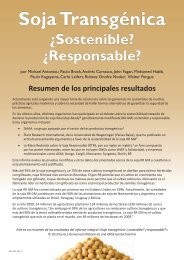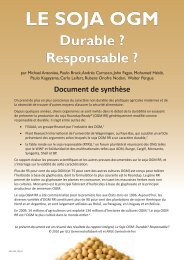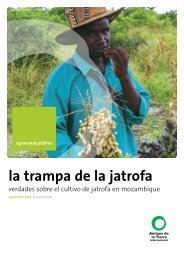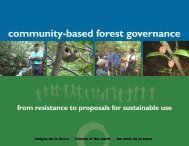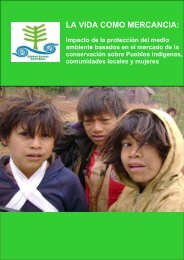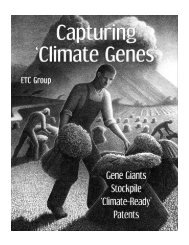Plantations, poverty and power - Critical Information Collective
Plantations, poverty and power - Critical Information Collective
Plantations, poverty and power - Critical Information Collective
You also want an ePaper? Increase the reach of your titles
YUMPU automatically turns print PDFs into web optimized ePapers that Google loves.
58<br />
transport the logs to the local town <strong>and</strong> contact a broker of illegal timber. The broker supplies documents<br />
that certify that the timber is from an area with a permit to be logged <strong>and</strong> is legal. The broker pays the<br />
villagers <strong>and</strong> transports the timber to the pulp mill. The pulp mill pays the owner of the logging permit,<br />
who then pays the broker for his services. 287<br />
In 2001, John Aglionby, a Guardian journalist, reported on illegal logging to supply Indah Kiat. He<br />
describes an illegal logging team’s work cutting an area of forest. “Every step in this chain is illegal,” he<br />
reported.<br />
“The loggers have no permits to destroy the rainforest <strong>and</strong> take the wood to Perawang, a small town halfway<br />
up Sumatra. [The loggers] have no right to buy it <strong>and</strong> sell it on to the pulp factory, for whom it is a<br />
serious offence to buy illegally felled timber.” 288<br />
The pulp mill in Perawang that Aglionby refers to is APP’s Indah Kiat mill. The logging team are<br />
villagers whose previously earned their living fishing in the Siak River. “Now there are no fish left,” one<br />
of them told Aglionby. “They have all been poisoned by the factory, so chopping down the forest is the<br />
only way we can make money.” 289<br />
“What shall we do” one of the villagers now involved in illegal logging asked Swedwatch’s researchers.<br />
“There is nothing left for us to live on, they have taken our l<strong>and</strong>, killed the fish <strong>and</strong> we would die if they<br />
stopped buying the wood from us. Indah Kiat has to buy! It is because of them that we lack possibilities<br />
to support ourselves.” 290<br />
In 2006, WWF reported that APP used timber from Libo forest for its pulp mills in Riau. Libo forest is<br />
part of the Balai Raja Wildlife Sanctuary, one of the few remaining habitats of the Sumatran elephant.<br />
Balia Raja contained about 39,000 acres of forest when it was declared a Wildlife Sanctuary in 1986. By<br />
2006, only 650 acres remained. 291<br />
APP is fully aware that it is buying illegally logged timber. In 2004, Anil Raina, from the corporate<br />
marketing department of Sinar Mas, told Swedwatch’s researchers that “If illegal logging is stopped it<br />
will be a hard blow against the local communities, however, since some of them may depend on this<br />
activity. Until we find some way to provide either some jobs or support for villagers, so they can survive,<br />
we will not enforce a total ban on logging.” 292<br />
APP’s forestry operations in Riau were halted in 2006 as a result of a police investigation into illegal<br />
287 Mats Valentin <strong>and</strong> Kristina Bjurling (2004) “Swedish involvement in the Indonesian paper <strong>and</strong> pulp industry”,<br />
SwedWatch, October 2004, page 20.<br />
288 John Aglionby (2001) “Fisherman driven to illegal logging as pulp factory poisons river. Sumatran communities put<br />
at risk”, The Guardian, 26 June 2001. http://www.guardian.co.uk/paper/story/0,10581,512597,00.html<br />
289 John Aglionby (2001) “Fisherman driven to illegal logging as pulp factory poisons river. Sumatran communities put<br />
at risk”, The Guardian, 26 June 2001.http://www.guardian.co.uk/paper/story/0,10581,512597,00.html<br />
290 Mats Valentin <strong>and</strong> Kristina Bjurling (2004) “Swedish involvement in the Indonesian paper <strong>and</strong> pulp industry”,<br />
SwedWatch, October 2004, page 20.<br />
291 “Indonesian Government Ignores Own Rules, Places Endangered Elephants in Peril”, WWF Press Release, 24 March<br />
2006. http://www.worldwildlife.org/who/media/press/2006/WWFPresitem843.html<br />
292 Mats Valentin <strong>and</strong> Kristina Bjurling (2004) “Swedish involvement in the Indonesian paper <strong>and</strong> pulp industry”,<br />
SwedWatch, October 2004, page 12.



